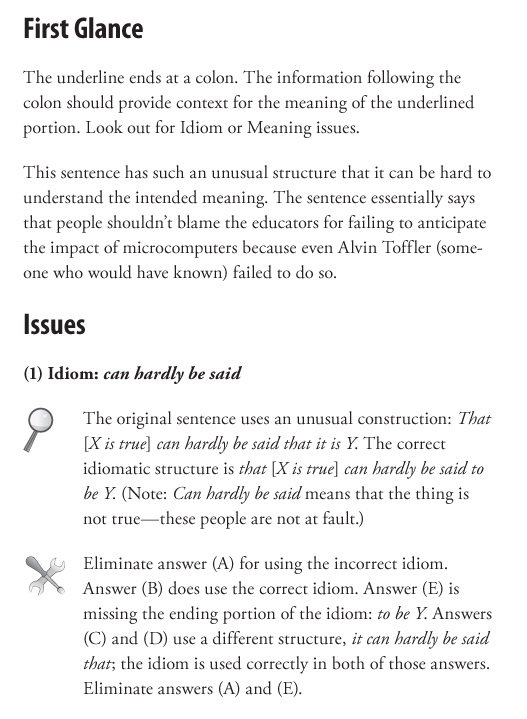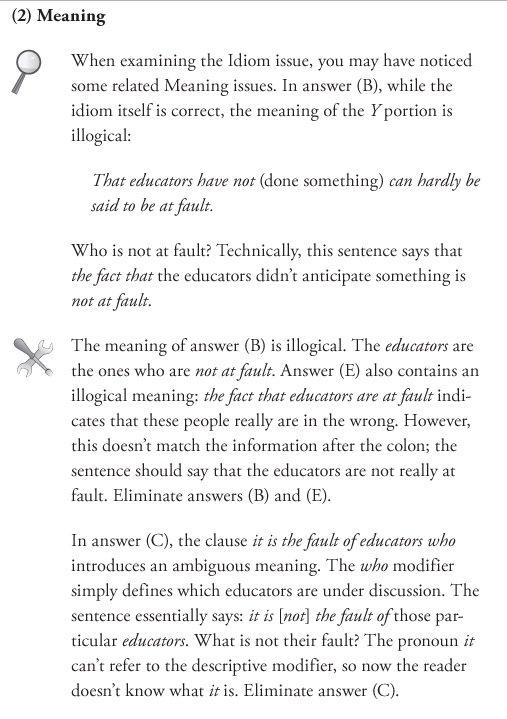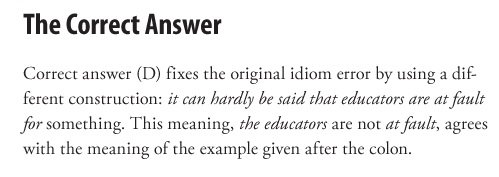Events & Promotions
|
|

GMAT Club Daily Prep
Thank you for using the timer - this advanced tool can estimate your performance and suggest more practice questions. We have subscribed you to Daily Prep Questions via email.
Customized
for You
Track
Your Progress
Practice
Pays
Not interested in getting valuable practice questions and articles delivered to your email? No problem, unsubscribe here.
- Nov 22
11:00 AM IST
-01:00 PM IST
Do RC/MSR passages scare you? e-GMAT is conducting a masterclass to help you learn – Learn effective reading strategies Tackle difficult RC & MSR with confidence Excel in timed test environment - Nov 23
11:00 AM IST
-01:00 PM IST
Attend this free GMAT Algebra Webinar and learn how to master the most challenging Inequalities and Absolute Value problems with ease. - Nov 25
10:00 AM EST
-11:00 AM EST
Prefer video-based learning? The Target Test Prep OnDemand course is a one-of-a-kind video masterclass featuring 400 hours of lecture-style teaching by Scott Woodbury-Stewart, founder of Target Test Prep and one of the most accomplished GMAT instructors.
Originally posted by Jasontuyj2012 on 11 Aug 2011, 18:41.
Last edited by Bunuel on 22 Feb 2022, 05:34, edited 2 times in total.
Last edited by Bunuel on 22 Feb 2022, 05:34, edited 2 times in total.
Edited the question.
Kudos
Bookmarks
D
Be sure to select an answer first to save it in the Error Log before revealing the correct answer (OA)!
Difficulty:
 25%
(medium)
25%
(medium)
Question Stats:
75% (01:28) correct 25%
(01:41)
wrong
25%
(01:41)
wrong  based on 7813
sessions
based on 7813
sessions
History
Date
Time
Result
Not Attempted Yet
That educators have not anticipated the impact of microcomputer technology can hardly be said that it is their fault: Alvin Toffler, one of the most prominent students of the future, did not even mention microcomputers in Future Shock, published in 1970.
(A) That educators have not anticipated the impact of microcomputer technology can hardly be said that it is their fault
(B) That educators have not anticipated the impact of microcomputer technology can hardly be said to be at fault
(C) It can hardly be said that it is the fault of educators who have not anticipated the impact of microcomputer technology
(D) It can hardly be said that educators are at fault for not anticipating the impact of microcomputer technology
(E) The fact that educators are at fault for not anticipating the impact of microcomputer technology can hardly be said
Similar Question : LINK
(A) That educators have not anticipated the impact of microcomputer technology can hardly be said that it is their fault
(B) That educators have not anticipated the impact of microcomputer technology can hardly be said to be at fault
(C) It can hardly be said that it is the fault of educators who have not anticipated the impact of microcomputer technology
(D) It can hardly be said that educators are at fault for not anticipating the impact of microcomputer technology
(E) The fact that educators are at fault for not anticipating the impact of microcomputer technology can hardly be said
Similar Question : LINK
Show Spoilernytimes article
https://www.nytimes.com/1982/04/25/education/schools-enter-the-computer-age.html
Thus far most efforts by educators to come to grips with the computer revolution have been modest and tentative. This is understandable when one recognizes that the microcomputer — the relatively small, inexpensive machine that has made computing feasible in schools and homes — is barely seven years old. In his 1970 book, ''Future Shock,'' Alvin Toffler did not even mention microcomputers!

0122.jpg [ 118.39 KiB | Viewed 50369 times ]

0123.jpg [ 117.8 KiB | Viewed 50331 times ]

0124.jpg [ 29.39 KiB | Viewed 50287 times ]
Thus far most efforts by educators to come to grips with the computer revolution have been modest and tentative. This is understandable when one recognizes that the microcomputer — the relatively small, inexpensive machine that has made computing feasible in schools and homes — is barely seven years old. In his 1970 book, ''Future Shock,'' Alvin Toffler did not even mention microcomputers!
Attachment:
0122.jpg [ 118.39 KiB | Viewed 50369 times ]
Attachment:
0123.jpg [ 117.8 KiB | Viewed 50331 times ]
Attachment:
0124.jpg [ 29.39 KiB | Viewed 50287 times ]
Kudos
Bookmarks
When I review this question with students, I find the best way to think about it is to think of the following structure as an idiom:
"It's surprising that __________"
"It can hardly be said that ________"
"It's unfortunate but true that __________"
This construction is a particular type of English idiom that's used to avoid putting a very long, complicated clause at the beginning of a sentence. Given the choice, most of us native English speakers should prefer (1) to (2) below:
(1) It's unfortunate that Jordan and Lee unexpectedly divorced after five seemingly happy years of marriage. - Good
(2) That Jordan and Lee unexpectedly divorced after five seemingly happy years of marriage is unfortunate. - Weird
You might want to cross off (1) because the 'it' doesn't seem to refer to anything. However, that's because in this particular idiom, there's a 'hollow it' that doesn't refer to anything at all, and that's okay. The 'hollow it' shows up in other English sentences too, like "It's raining" or "It's going to be beautiful outside today."
Really, what I think is being tested in options (A) and (B) is whether you recognize the 'it can hardly be said that ______' idiom, and whether you know that it's better to keep an idiom in its normal form than to move the bits around.
"It's surprising that __________"
"It can hardly be said that ________"
"It's unfortunate but true that __________"
This construction is a particular type of English idiom that's used to avoid putting a very long, complicated clause at the beginning of a sentence. Given the choice, most of us native English speakers should prefer (1) to (2) below:
(1) It's unfortunate that Jordan and Lee unexpectedly divorced after five seemingly happy years of marriage. - Good
(2) That Jordan and Lee unexpectedly divorced after five seemingly happy years of marriage is unfortunate. - Weird
You might want to cross off (1) because the 'it' doesn't seem to refer to anything. However, that's because in this particular idiom, there's a 'hollow it' that doesn't refer to anything at all, and that's okay. The 'hollow it' shows up in other English sentences too, like "It's raining" or "It's going to be beautiful outside today."
Really, what I think is being tested in options (A) and (B) is whether you recognize the 'it can hardly be said that ______' idiom, and whether you know that it's better to keep an idiom in its normal form than to move the bits around.
Kudos
Bookmarks
A - That educators have not anticipated the impact of microcomputer technology can hardly be said that it is their fault
That something has happened can hardly be said that it is their fault.
something = educators have not anticipated the impact of microcomputer technology
The second that is problematic.
If we change the construction to - That educators have not anticipated the impact of microcomputer technology can hardly be said to be their fault, I don't see any grammatical lapses, the construction is inelegant and awkward. I would look for a better construction.
B - That educators have not anticipated the impact of microcomputer technology can hardly be said to be at fault
That something has happened can hardly be said to be at fault.
something = educators have not anticipated the impact of microcomputer technology
What does it even mean? Who is at fault? An event cannot be at fault.
C - It can hardly be said that it is the fault of educators who have not anticipated the impact of microcomputer technology
who have not anticipated the impact of microcomputer technology is just a modifier modifying educators. So the sentence in essence reads - It can hardly be said that it is the fault of a certain kind of educators.
certain kind - those educators who have not anticipated the impact of microcomputer technology
Now what is the fault of educators? it has no referent.
E - The fact that educators are at fault for not anticipating the impact of microcomputer technology can hardly be said.
Something can hardly be said - Okay
Something - The fact that educators are at fault for not anticipating the impact of microcomputer technology
- Changes meaning. it is not a fact that educators are at fault for not anticipating the impact of microcomputer technology. In fact this very thing is debatable.
D - It can hardly be said that educators are at fault for not anticipating the impact of microcomputer technology - Perfect.
That something has happened can hardly be said that it is their fault.
something = educators have not anticipated the impact of microcomputer technology
The second that is problematic.
If we change the construction to - That educators have not anticipated the impact of microcomputer technology can hardly be said to be their fault, I don't see any grammatical lapses, the construction is inelegant and awkward. I would look for a better construction.
B - That educators have not anticipated the impact of microcomputer technology can hardly be said to be at fault
That something has happened can hardly be said to be at fault.
something = educators have not anticipated the impact of microcomputer technology
What does it even mean? Who is at fault? An event cannot be at fault.
C - It can hardly be said that it is the fault of educators who have not anticipated the impact of microcomputer technology
who have not anticipated the impact of microcomputer technology is just a modifier modifying educators. So the sentence in essence reads - It can hardly be said that it is the fault of a certain kind of educators.
certain kind - those educators who have not anticipated the impact of microcomputer technology
Now what is the fault of educators? it has no referent.
E - The fact that educators are at fault for not anticipating the impact of microcomputer technology can hardly be said.
Something can hardly be said - Okay
Something - The fact that educators are at fault for not anticipating the impact of microcomputer technology
- Changes meaning. it is not a fact that educators are at fault for not anticipating the impact of microcomputer technology. In fact this very thing is debatable.
D - It can hardly be said that educators are at fault for not anticipating the impact of microcomputer technology - Perfect.











